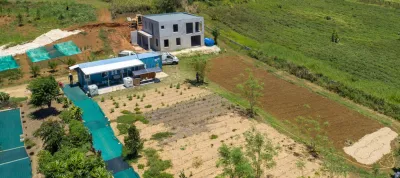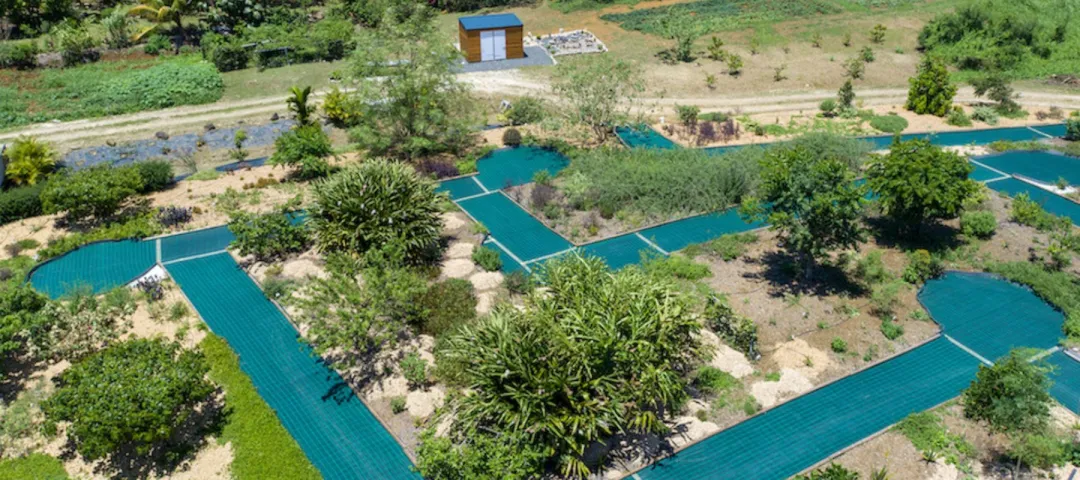General information
RDP Priority
- P2. Competitiveness
RDP Focus Area
- 2A: Farm’s performance, restructuring & modernisation
RDP Measure
- M04: Investments in physical assets
Beneficiary type
- Farmer / land manager
Summary
France's Guadeloupe is a Caribbean island that can be reliant on imports. CAP funds were used by a local female farmer to improve local supplies of food and medicinal crops on the island.
Farmer Esther Coqk's company, Magest Agri, is a member of the GBA ECO BIO producer group in Guadeloupe, and she recognises how collaborative farming practices, combined with product diversification, contribute to sustainable development. She runs a 5.5 ha organically-certified farm producing vegetables, melons, roots, tubers, medicinal plants, and pineapples. Agri-processing and educational visits also take place on the farm, which employs two full-time staff and proactively limits its environmental impacts.
CAP support from the Rural Development Programme co-financed costs involved with investing in new agri-food processing equipment and improvements to the farm's other capital assets. More benefits from the project included providing workplace training for people with special needs and providing 'open farm' services for schools.
Results
Outcomes helped improve the farm's economic viability through diversification, modernisation, and marketing.
Results promote environmental sustainability and reduce key inputs such as fertilisers.
Circular approaches reused organic waste for plant nutrition, improved water efficiency, and took advantage of natural ventilation.

Promoter
Magest Agri
Funding
Total budget 304 000 (EUR)
RDP support: 228 000 (EUR)
Private/own: 76 000 (EUR)
Keywords
Ressources
Documents
Liens
Context
In France’s Guadeloupe islands, small farms play key roles in food security and sustainable agricultural practices. Product diversification helps small farms to thrive in a competitive market. By cultivating a variety of crops, including fruits, vegetables, and traditional medicinal plants, farmers can cater to diverse consumer preferences while reducing vulnerability to price volatility associated with single-crop dependency.
By working together, farmers can share resources, knowledge, and best practices, thereby increasing their overall productivity and resilience against market fluctuations. This collective approach not only bolsters the local economy but also encourages the preservation of traditional farming techniques.
Furthermore, introducing children to local farms and crops through educational programmes fosters a sense of cultural heritage and environmental stewardship. Teaching children about indigenous flora and traditional medicinal plants enhances their understanding of biodiversity and promotes healthy living habits. Such educational initiatives can empower future generations to appreciate the value of local resources while instilling respect for nature's healing properties.
Farmer Esther Coqk's company, Magest Agri, is a member of the GBA ECO BIO producer group in Guadeloupe, and she recognises how collaborative farming practices, combined with product diversification, contribute to sustainable development.
Her 5.5 ha farm's production has been certified AB (French label for Organic Farming). It produces vegetables, melons, roots, tubers, medicinal plants, and pineapples. Agri-processing and educational visits also take place on the farm, which employs two full-time staff and proactively limits its environmental impacts.
Objectives
Several interrelated aims for this CAP-funded project supported the commercialisation of agri-processing for local crops. CAP helped:
- business development to increase competitiveness of healthy farm products (cassava and sweet potato flour, spices, teas, medicinal plants, food supplements, and oils).
- promote product ranges online to expand the customer base and facilitate customer purchasing.
- develop ‘open farm’ opportunities providing visitor services, particularly for younger generations.
- establish training for people with disabilities to enable workforce integration.
Activities
Project actions helped to adapt the company's growth by:
- purchasing material, fittings and equipment for production and processing facilities, including a solar-powered drier.
- establishing a direct sales point.
- launching a sales and advertising website.
Main results
- The outcomes helped improve the farm's economic viability through diversification, modernisation, and marketing.
- The results promote environmental sustainability and reduce key inputs such as fertilisers.
- Circular approaches reused organic waste for plant nutrition, improved water efficiency, and took advantage of natural ventilation.
Key lessons
- Collaborative efforts among local farms help reduce reliance on imported goods by fostering local production.
- Providing training for people with disabilities at small farms in Guadeloupe serves multiple beneficial purposes. It fosters inclusivity, enabling individuals with diverse abilities to participate in agricultural activities, enhancing their self-sufficiency and economic independence. Furthermore, such initiatives cultivate community engagement and promote social awareness regarding the capabilities of disabled individuals.
- Additionally, integrating people with disabilities into farming operations can lead to innovative practices and perspectives. The unique insights of these individuals can contribute to sustainable agricultural methods, thereby improving farm productivity.
Esther Coqk

